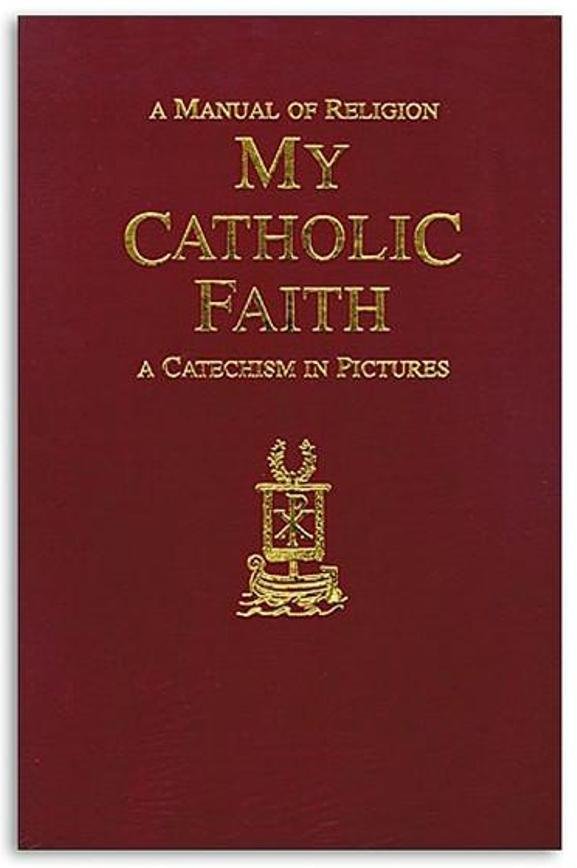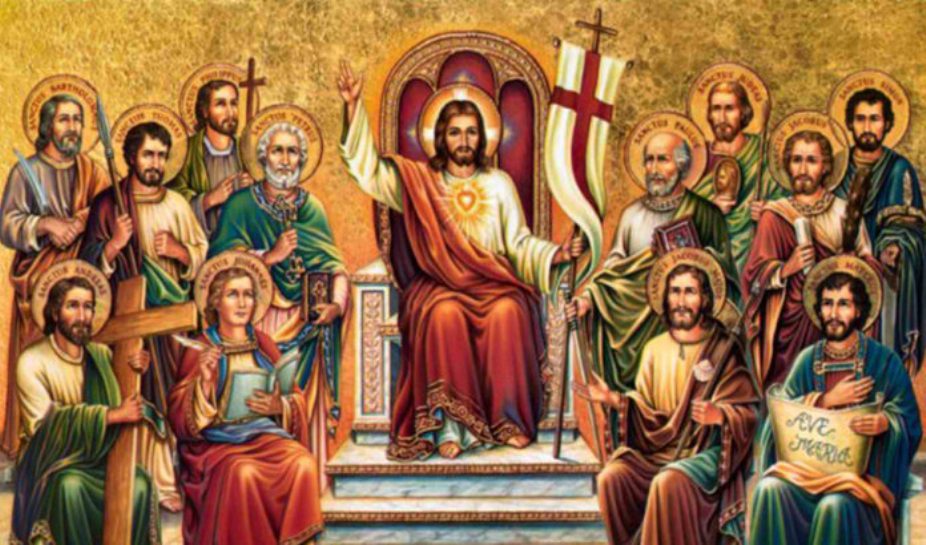DIVINE REVELATION PART 3: HOLY BIBLE AND SACRED TRADITION
THE TWO SOURCES OF DIVINE REVELATION
What are the SOURCES OF DIVINE REVELATION?
There are two Sources of Divine Revelation:
- The Holy Bible, and
- Sacred Tradition
(Reference: My Catholic Faith by Bishop Louise LaRavoire Morrow, S.T.D., p.19)
How did we come to know the Will and Truths which God revealed to us?
“Divine Revelation comes down to us by two means: through Holy Scriptures, written down under divine inspiration, and through Tradition handed down orally from Apostolic times. We read the Bible with great respect, for it is the Word of God. We treat Tradition with as great reverence, for God speaks through Tradition as well. It is wrong to believe the Bible alone without Tradition. That is like believing the Word of God written in the morning and denying it spoken in the afternoon.” (My Catholic Faith by BIshop Louise LaRavoire Morrow, S.T.D., p.14-15)
(ORAL) SACRED TRADITION
How do we call this oral tradition?
We call this “Sacred or Divine Tradition.”
“Divine Tradition is the unwritten word of God.” (Baltimore Catechism by Fr. Bennet Kelley, C.P., p. 20, Imprimatur: Francis Cardinal Spellman, Archbishop of New York, © 1969-1962, Catholic Publishing Co., N.Y.)

Was Divine Tradition written in the Bible?
No. Divine Tradition was not written in the Bible (though we can read the word ‘tradition’ in 2 Thes.2:14)
“Divine Tradition is the unwritten word of God- that is truths revealed by God, though not written in the Bible, and given to the Church through word of mouth by Jesus Christ or by the apostles under the inspiration of the Holy Ghost.” (ibid.)
Did Divine Tradition remain unwritten through the years?
No, Divine Tradition did not remain unwritten through the years. There was a time when Saints and Martyrs of the Catholic Church wrote these Sacred Traditions of the Apostles and Apostolic Fathers.
“Divine Tradition has been committed to writing, especially by saintly writers called FATHERS, who lived in the early centuries but were not inspired, as were those who wrote the Bible.” (ibid.)
“All the truths of Divine Tradition now have found their way into books. From the first Christian centuries the practices and doctrines of Tradition were preserved by saintly teachers whom we call Fathers of the Church. They were disciples of the Apostles, contemporaries of those disciples or disciples of the disciples. These holy and learned men instructed the Church in the years of its own growth. Chief among the Fathers of the first six centuries (date is of death) are: the Doctors of the Church, and Saints Clement of Rome (99), Ignatius of Antioch (107), Polycarp (155), Justin (165), Irenaeus (202), Cyprian (258), Dionysius (265), Gregory Thaumaturgus (270), Optatus (372), Martin of Tours (397), Gregory of Nyssa (398), Ephipanius (403), Celetine I (432), Vincent of Lerins (450), and Caesarius of Arles (542).” (My Catholic Faith by Bishop Louise LaRavoire Morrow, S.T.D., p.19)
Aside from the writings of the Fathers, where can we find the Truths of Divine Tradition?
“Besides the writings of the Fathers, the truths of Divine Tradition may be found in: (a) writings of the Doctors of the Church; (b) writings of Popes and Church Councils; and (c) the liturgy of the Church as found in the Missal and Rituals.” (ibid.)
SACRED SCRIPTURES
What is Sacred Scriptures?
Sacred Scriptures refers to the Holy Bible, the written Word of God.
Bible is a Book but it is a very different book from the other books since it is Holy.
Why is the Bible Holy?
The Bible is Holy because it is the Word of God. It was written by the Saints, Prophets and holy men from the Chosen people of God. “Understanding this first, that no prophecy of scripture is made by private interpretation. For prophecy came not by the will of man at any time: but the holy men of God spoke, inspired by the Holy Ghost.” (2 Pet.1:20-21).
Who kept the Bible since it was written?
The Holy Mother, the Church kept the Bible since it was written. Martin Luther, in his book “Commentary on St. John Chapter 14, said, “We are compelled to concede to the papists (i.e. Catholics) that they have the Word of God (Bible) that we received it from them and that without them, we should have no knowledge of it at all.”
“The Bible is the written Word of God.” (Baltimore Catechism by Fr. Bennet Kelly, C.P., p.17)

Can the Bible contain errors?
No. The Bible cannot contain errors. “Since God is the Author, the Bible cannot contain any error….Since the Bible is the Word of God, it must be treated with the greatest reverence.” (My Catholic Faith by Bishop LaRavoire Morrow, p.25).
What is the purpose of the Bible?
The Bible was made for instruction and sanctification of mankind.
“The Bible is the written Word of God, committed to his Church for the instruction and the sanctification of mankind.” (Baltimore Catechism by Fr. Bennet Kelly, .P., p.20).
Does Bible contain only one book?
No, the Bible contains several books.
There are 73 books in the Bible. These books were carefully chosen by the Church through its Popes and Sacred Councils.
From the “Decree of Damasus” during the Roman Synod in 382 A.D., Christians were taught that there were only 73 books in the Bible. It was enumerated by that Synod of Rome. Thus, the Canon of the Sacred Scriptures was already defined 12 centuries before the coming of Luther. (Source: Sources of Catholic Dogma from Henry Denzinger’s Enchiridion Symbolorum translated by Roy J. Deferrari, p. 33-34, Imprimatur: Patrick A. O’Boyle, Archbishop of Washington, April 25, 1955, © Loreto Publications)
What are these 73 books of the Bible?
These 73 books of the Bible includes:
The 46 books of Old Testament and 27 books of the New Testament.
Are all doctrines of Our Lord Jesus Christ in the Bible?
Not all doctrines of Our Lord Jesus Christ is in the Bible.
“But there are also many other things which Jesus did; which, if they were written every one, the world itself, I think, would not be able to contain the books that should be written.” (Jn.21:25) “Many other signs also did Jesus in the sight of his disciples, which are not written in this book. But these are written, that you may believe that Jesus is the Christ, the Son of God: and that believing, you may have life in his name.” (Jn.20:30).
TRADITION IS OLDER THAN THE BIBLE
Which came first: Bible or Tradition?
Tradition came first.
“Tradition is older than the New Testament. …If the Church teaches any doctrine that cannot be found in Holy Scripture, it will be found in Tradition, and therefore traceable to the Apostles.” (My Catholic Faith, p.19).
There were 372 years, since Christ, that the Church preached the Gospel even without the Bible.
Our Lord Jesus Christ, who chose 12 Apostles as first members of His Church (St. Paul was added later), taught them the Truths through oral instructions. Jesus was a preacher and not a writer.
Out of 13 Apostles, only six of them were writers. They were St. Matthew, St. John the Beloved, St. Paul, St. Peter, St. James the less (the son of Alpheus) and St. Jude Thaddeus. (Note: St. Paul was not among the original 12 but was added by Our Lord as His Apostle, Rm.1:1; )
The other 7 Apostles did not write any book in the Bible but they also preached. They were St. Andrew, St. James the son of Zebedee, St. Philip, St. Bartholomew, St. Thomas, St. Simon the Cananean, and St. Matthias (who replaced Judas Iscariot).
St. James the less wrote one of the Epistles found in the New Testament. (cf.The New Marian Missal by Fr. Sylvester P. Juergens, S.M., Doctor of Sacred Theology, p.964)
The first Christians taught the Gospel orally. It was later on that they decided to compile what they wrote and preached.
“The ORAL TRADITION OF EARLY CHRISTIANITY WAS GRADUALLY REPLACED BY COMPOSED NARRATIVES, the earliest of which was probably the Gospel of St. Mark.” ( Timetables of History by Random House, Inc.p.71, © 1991 by Random House, Inc., emphasis mine)
Sources:
(1) Except when specified, all Biblical Verses were taken from Douay-Rheims Bible.
(2) My Catholic Faith by Bishop Louise LaRavoire Morrow, S.T.D
(3) Google images
(4) Baltimore Catechism by Fr. Bennet Kelly
(5) Denzinger, Sources of Catholic Dogma by Henry Denzinger



Hm, fascinating. But there's one thing that I'm still wondering about.
Supposing there was a group of people traveling about your area, led by a charismatic speaker who claims that the world is ending soon. He promises he alone can save you, but only if you sell your belongings, devote the rest of your life to him, and cut off family members who try to stop you.
He also wants to change your name, advises you to leave your home/job if necessary to follow him, and says that if you don’t love him more than your own family, you’re not worthy of him. What sort of group is that?
Thanks for Upvoting my Post, @alexbeyman. I really appreciated it.
For me, a group with a "charismatic leader who has many claims and a promise that he alone can save me", is a cult.
It is obvious.
If that “charismatic speaker who claims that the world is ending soon” according to his own calculations of days, then I can say that he is a false prophet.
Our Lord told his Disciples, “But of that day and hour no one knoweth, not the angels of heaven, but the Father alone.” (Mat.24:36).
In 2012, some people of the world waited for the “end of the world” according to some prophecies but the world still continued revolving around the sun with the people in it.
We have seen many individuals who founded their own “groups/movements” based on their attempts to foretell the future of the world. It already happened in the past. It’s so sad to say, this is still happening today in many places.